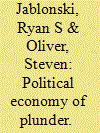| Srl | Item |
| 1 |
ID:
129991


|
|
|
|
|
| Publication |
2014.
|
| Summary/Abstract |
Despite allegations that foreign aid promotes corruption and patronage, little is known about how recipient governments' electoral incentives influence aid spending. This article proposes a distributional politics model of aid spending in which governments use their informational advantages over donors in order to allocate a disproportionate share of aid to electorally strategic supporters, allowing governments to translate aid into votes. To evaluate this argument, the author codes data on the spatial distribution of multilateral donor projects in Kenya from 1992 to 2010 and shows that Kenyan governments have consistently influenced the aid allocation process in favor of copartisan and coethnic voters, a bias that holds for each of Kenya's last three regimes. He confirms that aid distribution increases incumbent vote share. This evidence suggests that electoral motivations play a significant role in aid allocation and that distributional politics may help explain the gap between donor intentions and outcomes.
|
|
|
|
|
|
|
|
|
|
|
|
|
|
|
|
| 2 |
ID:
121849


|
|
|
|
|
| Publication |
2013.
|
| Summary/Abstract |
Maritime piracy is a growing scourge on the international community-imposing large costs on maritime states and the shipping industry, as well as potentially undermining state capacity and funding terrorism. Using original data on over 3,000 pirate attacks, the authors argue that these attacks are, in part, a response to poor labor market opportunities. To establish this, the authors take advantage of the strong effect of commodity prices on labor market opportunities in piracy-prone states. Consistent with this theory, the authors show that changes in the price of labor- and capital-intensive commodities have consistent and strong effects on the number of pirate attacks in a country's territorial waters each month. The authors confirm these results by instrumenting for commodity prices using monthly precipitation levels.
|
|
|
|
|
|
|
|
|
|
|
|
|
|
|
|